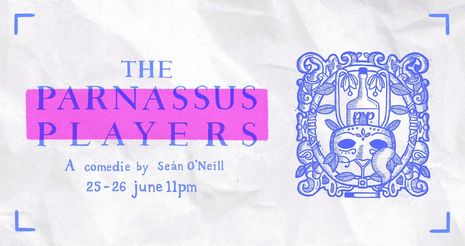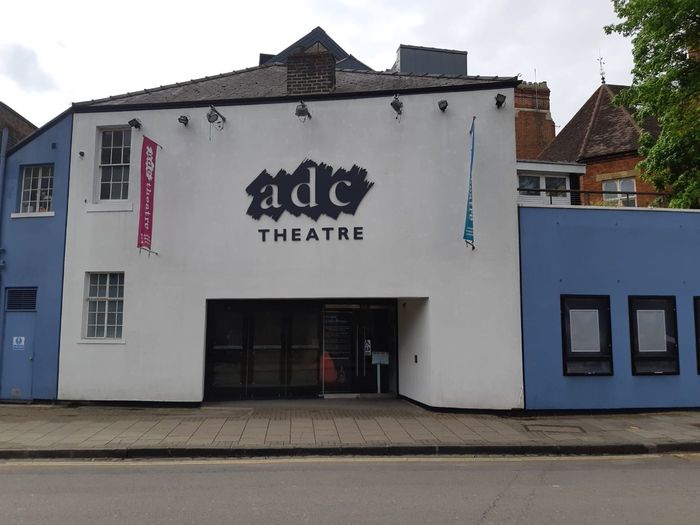The Parnassus Players: An engaging and witty satire of making theatre happen
Emma Robinson reviews Sean O’Neill’s The Parnassus Players

Sean O’Neill’s blend of the effusive (or just crude) language of Shakespeare and the bitingly direct criticism of the modern theatre scene – often specific to Cambridge – in The Parnassus Players is a brilliant demonstration of writing for an audience. So many of the jokes landed perfectly because they were connected to the shared experience or awareness that most of the audience would’ve had. However, beneath the humour, as with all good satire, it critiqued the system it represented; it alluded to the intellectualisation, competitiveness and even nepotism which marks the underbelly of theatre, becoming thought-provoking as well as just good fun.
“As with all good satire, it critiqued the system it represented”
The performance did not need to rely only on the writer’s wit however; it was bolstered by the energised physicality of the cast directed by Tom Chandler and Lara Cosmetatos. Admittedly, the exaggerated, ‘all limb’ drunkenness of Saul Bailey while he first stumbled onstage as the boisterous Robert Greene didn’t earn my laughter. As the play progressed, however, Bailey’s characterisation gained a sincerity, and I grew accustomed to the overall performative style of the play, a style which the rest of the cast shared perhaps too consistently – sometimes without enough intention.
Jasper Cresdee-Hyde, who incredibly stepped in last minute to play Shakespeare, moved into satirical dramatism with consideration and intention. Rather than constructing a caricature, his Shakespeare was at moments performed with a self-indulgent excessiveness and at others with an authoritative directness. While whirled up in the energy of an enthusiastic cast and a vocally engaged audience (which is so sadly rare with this term’s small audiences) Cresdee-Hyde retained an essential self-awareness and control.
“One-liners are essentially reinforcing the narrative arc”
Attempting to write a somewhat adequate play to compete for Shakespeare’s devout audience, Robert Greene and Tom Nashe incessantly butt heads. As Tom, performed by Sam Drysdale, proactively tries to push their ambitions forward, Robert’s problematic past and initial complacency get in the way. Ironically, they are both very relatable instincts for an audience of university students. The friendship beneath their professional circumstances, however, is what provides the play’s structure with stakes, otherwise the possible fracturing of their theatre company would have no emotional significance. O’Neill’s understated use of multiple repartees of ridiculous insults between the pair as a means of expressing their ‘affection’ for one another points towards the dual purpose of his humour, as one-liners are essentially reinforcing the narrative arc. Ultimately, the play’s far-reaching and sometimes tangential satire is grounded perfectly by this central friendship.
Having said that, this was not my favourite friendship; instead it was that of the feisty Christina Harrington and the innocent, people-pleasing Elizabeth Constant. Their nuanced and fluctuating dynamic retained my curiosity. Emily Macpherson Smith’s initially assertive performance as Christina becomes increasingly less self-assured as Christina loses her role as director, subsumed into the chaos of a collaborative company of actors. Meanwhile, Elizabeth, played by Chloe Stark, without the wit of the rest of the characters, proves herself the most intelligent. While the play immediately subverts the valorising of Shakespeare, it is exciting to see a more gradual undercutting of the audience’s established idea of the characters within this duo.
Unfortunately, the play suffered from an overuse of blackout and slightly clumsy lighting transitions, which compromised its energy. Considering the performance’s metatheatrical dismissal of the fourth wall and self-reflexive reference to the play-within-a-play structure (to use all the ‘theatre’ terms they themselves mock), it seemed unnecessary to hide the scene changes in a blackout. Also, the characters’ theatre company self-confesses to being absolutely broke to such an extent that they all branch out into new roles, either as actors or producers. Therefore, I felt they missed an opportunity to have the actors do the scene changes themselves. The chaotic and slap-dash nature of the play within the play could’ve spread out into the play itself, giving a performance which is optimising on every second of stage-time.
I couldn’t say completely what this play is, at least not in any concise way, but I think it knew exactly what it wanted to be, and it more than succeeded in delivery, and was deserving of every laugh and applause it got (and there were many).
 News / Cambridge academics stand out in King’s 2026 Honours List2 January 2026
News / Cambridge academics stand out in King’s 2026 Honours List2 January 2026 Interviews / You don’t need to peak at Cambridge, says Robin Harding31 December 2025
Interviews / You don’t need to peak at Cambridge, says Robin Harding31 December 2025 Comment / What happened to men at Cambridge?31 December 2025
Comment / What happened to men at Cambridge?31 December 2025 Features / “It’s a momentary expression of rage”: reforming democracy from Cambridge4 January 2026
Features / “It’s a momentary expression of rage”: reforming democracy from Cambridge4 January 2026 News / AstraZeneca sues for £32 million over faulty construction at Cambridge Campus31 December 2025
News / AstraZeneca sues for £32 million over faulty construction at Cambridge Campus31 December 2025










